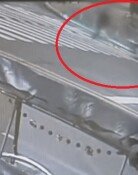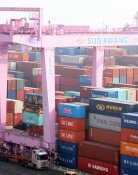Hu Jintao, a Man with Rational Leadership
Hu Jintao, a Man with Rational Leadership
Posted November. 08, 2002 22:49,
It is difficult to see the desperation first generation of the Chinese revolution had in Hu Jintao. If the first generation such as Mao Tse-tung or Deng Shaoping brought a raging wind to the Chinese continent, Fu has managed to survive in the raging wind.
Hu was selected as the next generation leader in Oct. 1992, when he became the youngest member of the Politburo Standing Committee. In the same year, Deng was emphasizing the inevitability of reform and openness during his tour to the Shenzen region. He needed to inject young blood to the Politburo Standing Committee in order to have the trend take firm root.
At that time, media not only in the mainland but also in Japan and Hong Kong began to see Hu`s enthronement as a matter of time. But Hu, who had learned how to bend knees amid a shambles of the Cultural Revolution, kept a low profile despite his success in career. It was when Jiang Zemin handpicked by Deng was making his presence known as the nation`s leader.
Hu was born to a tea vendor in Shanghai in Dec. 1942, when the war against Japan neared a end. In Mao`s era, Hu`s father was categorized as the small businessmen class. The small businessmen class, which was neither a target of the revolution, nor a leading force, had a great influence on Hu`s growth and way of leading a life in the future.
Amid the whirlwind of the revolution, Hu`s family fortune was on the wane and moved to Taizeu. At that time, Hu wrote that he wanted to travel around the world on a large ship at school. He was the only boy who expressed such a dream at his school in the inland area.
Fu entered the prominent Chinghwa University at the age of 17. He majored in irrigation, which was unpopular study at the time. But Fu chose the major because he was not sure if he could go to other popular departments since he hailed from the `small businessmen` class.
As soon as he enter the university, Hu became a member of the youth group of the Communist Party. He worked as a secretary in the youth group.
In 1970, when Deng and Hwa Guopung were engaged in power struggle, the youth group supported Deng and emerged as a main force.
Hu was transferred to the remote Gansu region in 1966, when the Cultural Revolution was sweeping through the entire country. Then he met his lifetime mentor and political guardian, Sung Ping. Sung later recommended Hu to Hu Yaobang, who appointed Hu as the secretary of the youth group. In 1992 Hu could become the youngest member of the Politburo Standing Committee because Sung persuaded Chaos to replace his with Hu.
Hu has gained broad popularity from not only the conservatives but also the reformists.
An armed conflict in Tibet in 1989 could be suppressed early because the conservatives believed Hu`s loyalty to the party and dispatched military forces at an earlier stage. At that time, Hu successfully showed his resolution to firmly reacting to crises. On the other hand, he also socializes well with other people and values flexibility inside the party, earning reputation among the reformists.
Hu`s political inclination has never been revealed. There are few revolutionary or bold expressions in his reports or lectures. Many people think that for now, he will display his leadership focusing on the political consensus rather than charisma. As he is guaranteed to serve as the supreme leader of the nation until he turns 70, the lack of charisma and ability to control the organization is expected to serve as a huge burden to Hu.
Rae-Jeong Park ecopark@donga.com







